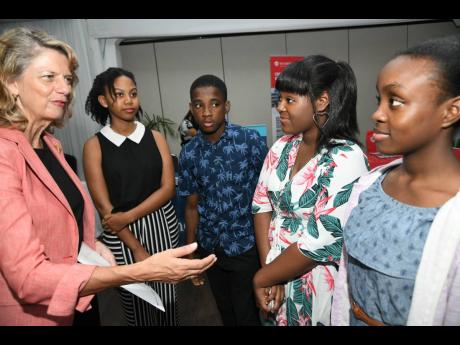Canada invites Jamaicans to study
Colleges and universities in Canada have seen a dramatic increase in the number of Jamaicans enrolled those tertiary institutions in the past decade. The spike in the numbers is being attributed to the vastly sophisticated programmes and other opportunities offered that Jamaicans are eager to pursue.
According to Richard York, commercial counsellor at the Canadian High Commission in Kingston, Jamaicans chase degrees and diplomas in areas such as wind farm technology, agriculture, marine technology, engineering, nursing, and hospitality.
York is a key organiser of the EduCanada Fair, which was launched last Sunday at the Spanish Court Hotel in Kingston.
Representatives of 31 institutions visited Jamaica for the three-parish tour. The tour also took the group to Northern Caribbean University in Manchester and the Holiday Inn Resort in Montego Bay.
“We have increased the number of Jamaicans studying in Canada substantially over the last 10 years. Ten years ago, we had about 400 Jamaican students; now we are close to 4,000. They do a bit of everything,” York said, revealing that many Jamaicans have also expressed an interest in aeronautics.
Encouraging more Jamaicans to study in Canada, York said that his country is safe that and the quality of life there is very high. He said that many have gone to universities outside of Toronto, in areas not so popular. He noted, however, that those numbers have been trending upwards.
“Canada is a safe and stable country. We are consistently ranked in the top countries in the world in terms of quality of living. People are comfortable and safe. People feel welcomed in Canada, as it is a tolerant and inclusive society. We strive to be socially inclusive to respect human rights, freedom of conscience, religion, thought, beliefs, opinions, and lifestyles,” York stated.
Another element young Jamaicans could consider is the affordable price packages offered, when compared to universities in the United States and the United Kingdom, said to High Commissioner Laurie Peters.
TUITION
On average, an undergraduate nursing degree could cost CAD$20, 000, while a graduate degree could cost CAD$15, 000. Undergraduate pharmacy studies could cost up to CAD$ 34,000 while a graduate degree could cost CAD$11,000. An engineering undergraduate programme could cost CAD$30, 000, while a graduate programme would cost CAD$17, 000. By comparison, an engineering degree in the United States could cost upwards of US$40,000.
STRENGTHENING BOND
Peters sought to brush aside the notion that Canada was underpopulated and was therefore seeking to pull some of the brightest minds from Jamaica by offering educational opportunities. She said that Canada was not trying to make up its numbers, but instead is furthering the bond between both countries for mutual benefits.
Canada is the second-largest country in the world (behind Russia), yet we have only 35-37 million people, most of who live along the Canada-USA border. There are enormous opportunities for anyone wishing to come to Canada to live, work, and study. I don’t see it as an issue being underpopulated. I see it as an opportunity. Canada is known for inclusiveness, our welcoming nature, and our diversity.
“There are opportunities, and we have had decades of flow between our two countries, and I think it is not because we are solving the issue of Canada’s underpopulation. It is rather that who are seeking opportunities to build a new life.”
Peters said that more than 720,000 international students from all over the world were pursuing education in Canada.

